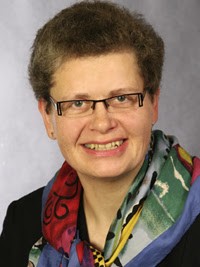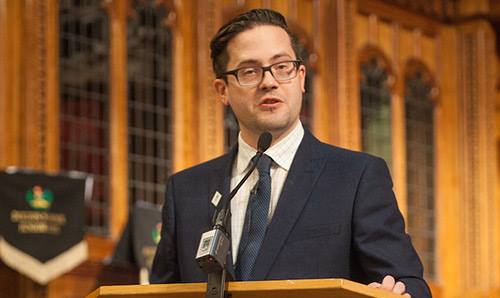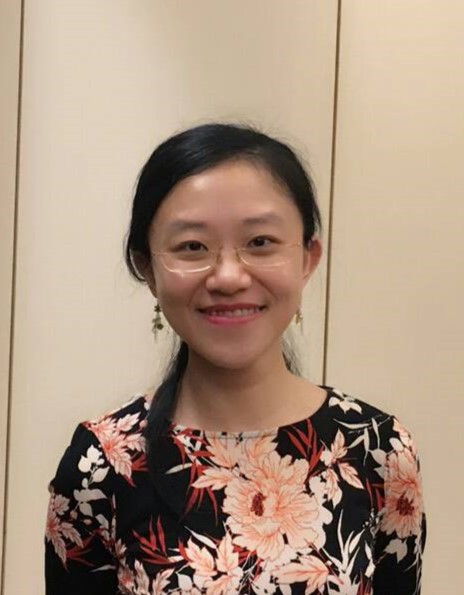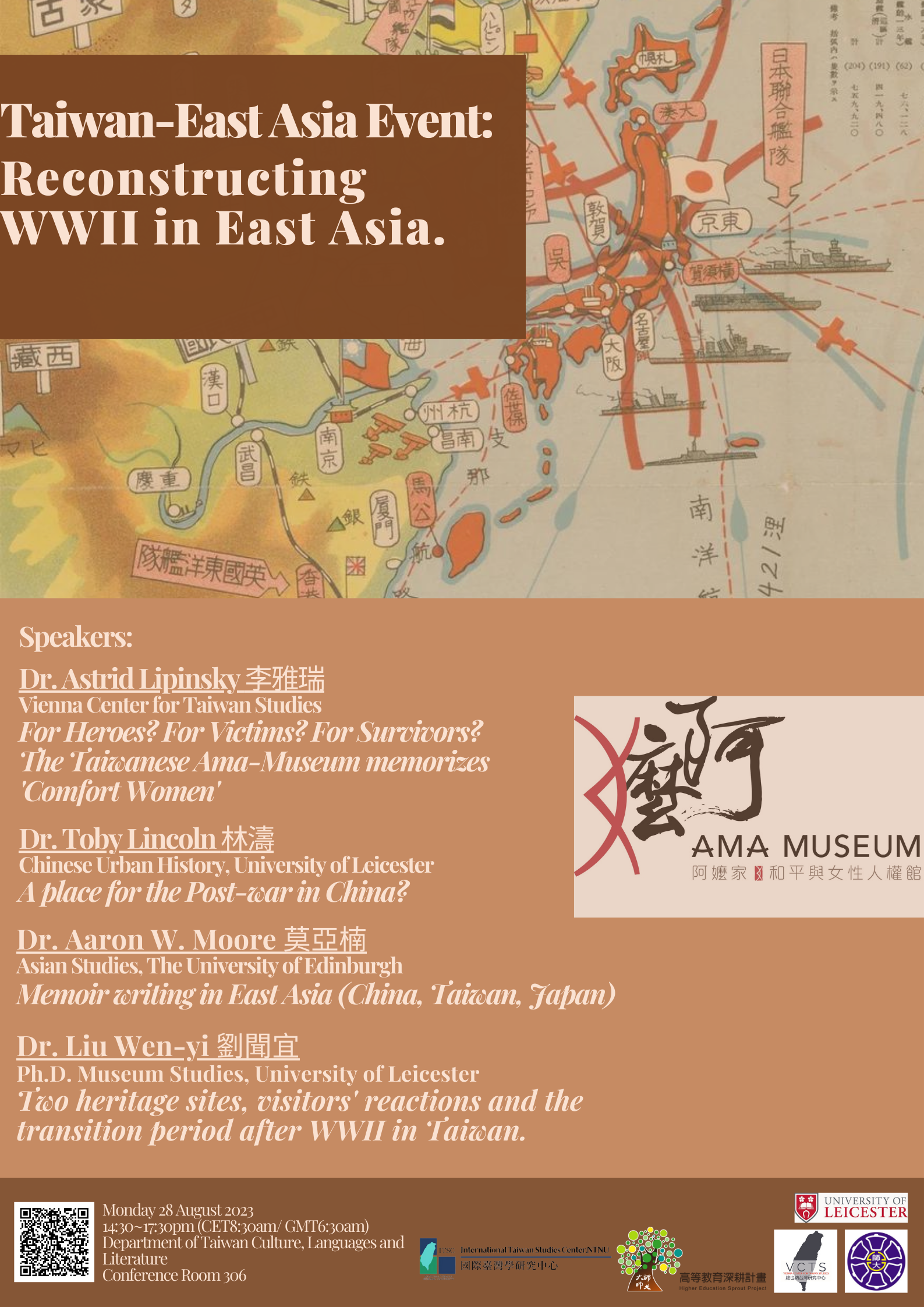Taiwan-East Asia Event: Reconstructing WWII in East Asia
How does the immediate postwar experience of East Asia fit the global story of how the world recovered from the most devastating war that humanity has perpetrated on itself? Where do the nation-states in East Asia until today find little common ground, and what are some of its causes? Exploring the historical narratives by Japan, Korea, China and Taiwan with regard to Imperial Japan is but one of the challenging research clusters. This workshop addresses some of these topics in an engaging dialogue on historical reckoning and healing from a practical and a theoretical perspective.
戰後時期,東亞的處境是如何在全球戰爭的陰影下,讓人類從這場自身引發的毀滅性災難中恢復過來?然而,至今東亞各國仍難以達成一致的共識,這種情況背後又有哪些原因呢?我們著眼於日本、韓國、中國以及台灣,探究他們在面對日本帝國的歷史時所呈現的不同敘事,這是一個充滿挑戰性的研究範疇。透過實際案例和理論思考,這個工作坊將以引人入勝的方式進行討論,探討一些歷史清算與和解處理的議題。
Location: Department of Taiwan Culture, Languages and Literature, Conference Room 306
Date and Time: Monday 28, August 14:30 ~ 17:30PM (HYBRID; CET: 08:30AM, GMT 07:30AM)
Language: English
Registration: Click Here
Deadline for online & in person registration: Thursday 24, August
Webinar Link: https://meet.google.com/anx-chuo-eyb
Contact Email: ntnutaiwancenter@gmail.com
地點:國立台灣師範大學台灣語文學系@台北市雲和街1號3樓306會議室
時間:2023 年 8 月 28 日(一)下午 2:30 ~ 5:30
會議語言:英語
報名網址:點此前往
現場及線上報名截止日:8 / 24(四)
Event Details
Lecture Records List
Speakers

Dr. Astrid Lipinsky 李雅瑞 (Vienna Center for Taiwan Studies): For Heroes? For Victims? For Survivors? The Taiwanese Ama-Museum memorizes ‘Comfort Women’
Record
Profile
Convenor Vienna Center for Taiwan Studies, University of Vienna
Institut für Ostasienwissenschaften/Sinologie
Wiener Zentrum für Taiwanstudien
https://ufind.univie.ac.at/en/person.html?id=33696
https://vcts.univie.ac.at/
Institut für Ostasienwissenschaften/Sinologie
Wiener Zentrum für Taiwanstudien
https://ufind.univie.ac.at/en/person.html?id=33696
https://vcts.univie.ac.at/
Abstract
This talk is based on numerous visits and interviews with the Ama Museum
staff and discusses which picture of the former ‘comfort women’ the
museum and the NGO behind the Ama Museum, the Taipei Women’s Rescue
Foundation (TWRF), paint. Which primary aims does the Museum have, and
do visitors agree and accept? After the last known Taiwanese ‘comfort
woman’ passed away, former methods to memorize publicly like court
proceedures in Japan, the visits of Japanese supporters to ‘comfort
women’ in Taiwan, regular demonstrations with former ‘comfort women’ in
front of the Japanese Representative Office in Taipei or a film with
‘comfort women’ (Song of the Reed, 2019) are no longer feasible.
However, the issue has to be established as an eternal part of Taiwanese
human rights debates.
Dr. Toby Lincoln 林涛 (Chinese Urban History, University of Leicester): A place for the Post-war in China?
Record
Profile
School of History, Politics & International Relations, Leicester
University
Chinese Urban History
PGR Director, College of Social Sciences Arts, Humanities
https://le.ac.uk/people/toby-lincoln
Chinese Urban History
PGR Director, College of Social Sciences Arts, Humanities
https://le.ac.uk/people/toby-lincoln
Abstract
The history of the immediate post-war period in China is dominated by
the linked narratives of the Communist Revolution and the Civil War.
This means that the way China recovered from and began to come to terms
with the trauma of WW2 remains unexplored. Here, I review briefly what
the history of the post-war period from other societies in Europe,
Japan, the USSR, and Taiwan may offer to scholars seeking to explore the
legacies of WW2 in China. In doing so, I argue that despite diverging
politically from many other parts of the world, the post-war experience
in China should be written into the global story of how the world
recovered from the most devastating war humanity has perpetrated on
itself.

Dr. Aaron W. Moore 莫亞楠 (Asian Studies, The University of Edinburgh): Memoir writing in East Asia (China, Taiwan, Japan)
Record
Profile
Handa Chair of Japanese-Chinese Relations
Asian Studies, The University of Edinburgh
Professor Aaron William Moore | The University of Edinburgh
Asian Studies, The University of Edinburgh
Professor Aaron William Moore | The University of Edinburgh
Abstract
Casual observers of life-writing from the war years, in particular,
often create hierarchies of reliability according to time period and
genre. Wartime diaries are more reliable than postwar memoirs, and
memoirs are more reliable than later oral histories, but in my previous
publications, I have tried to disrupt these assumptions and focus more
attention to the possibilities and limitations presented by genre.
Reflecting on my 2011 Modern Asian Studies publication, ‘The Problem of
Changing Language Communities’, in this paper I will discuss some of the
memoirs written by veterans of WWII, as well as summarising how they
relate to wartime diary writing. In addition to this, I hope to show how
historical memory continues to shape conversations about the war years,
by setting topics and concerns for later writers. Diaries, memoirs, and
oral histories do not exist in distinction with one another, but on a
continuum of perspectives about the past that overall reveal the paucity
of language when relating historical experience.

Dr. Liu Wen-yi, 劉聞宜 (Ph.D. Museum Studies, University of Leicester): Two heritage sites, visitors’ reactions and the transition period after WWII in Taiwan
Record
Profile
Ph.D. Museum Studies, Leicester University
I am Wen-Yi Liu, graduated as a PhD in the School of Museum Studies,
University of Leicester in July 2022. My research focuses on
dark/negative histories and heritage sites in Taiwan; the historical
periods are mainly concentrated on Japanese colonial period (1895 – 1945
A.D.) and the White Terror (1949 – around 1987). In my thesis, I also
discuss the difference between the terms ‘dark’ and ‘negative’ regarding
heritage.
Abstract
In this talk, two heritage sites in Taiwan are examined, revealing
visitors’ reactions and the historical backgrounds that result in such
expressions. The two heritage sites are Chia-Yi Old Prison, which was
erected when Taiwan was colonised by the Japanese government, and
Jing-Mei Memorial Park, which performed as a detention centre and prison
in the White Terror period. These two historical periods cover the
beginning, the end of WWII and great transitions of
governments/policies/systems/ideologies and so on; the crash of
different ideologies and the harsh situation of civil war in mainland
China had caused various chaos and conflicts in Taiwan. The transition
period and the profound legacies have largely influenced current
Taiwanese people’s impressions on and attitudes to the past and
different groups of people, and the repairing process is still in
progress.
Organizing Committee 台灣語文學系
Ann Heylen 賀安娟 國際台灣學研究主任
Frank Chen 陳楷峯
Lap-kan Au 區立勤
Stephanie Wei 魏玉菁
Un-tiong Lim 林允中
Kiun-Lip Fu 胡均立
Marisol Lin 林曦


